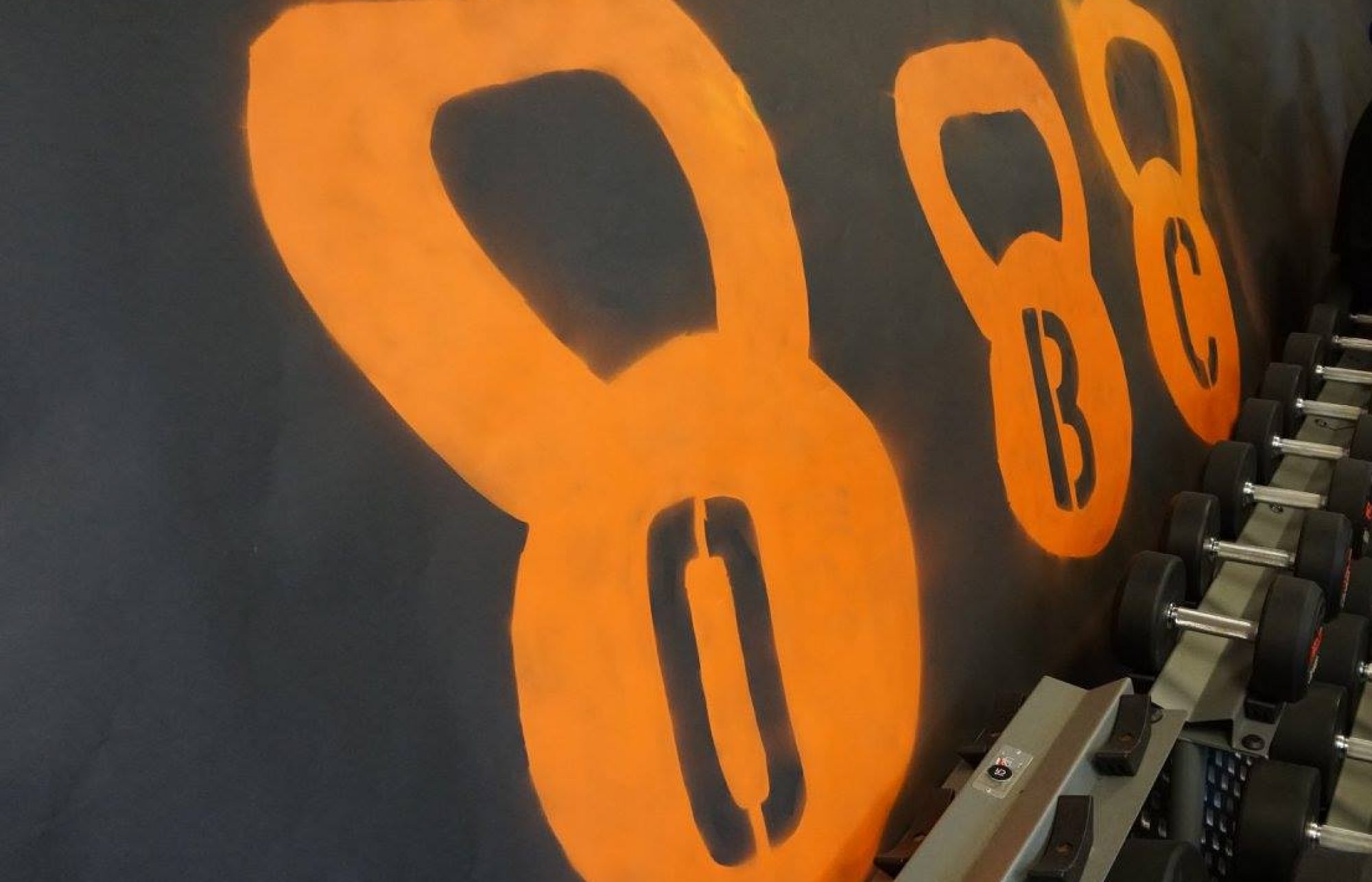After a very busy year of training and competing in both strongman and powerlifting, there are a number of important lessons I have learned that I feel compelled to consolidate and reflect upon. But first, a little bit of context to demonstrate where I was at in my training career going into 2019.
In 2016 I started working with an international gold medalist powerlifting coach, Mark Macqueen. I weighed 95kg and my powerlifting total (in the gym) was 440kg. Two full years later under his guidance, I had increased by bodyweight to 108kg, total to around 590kg, and competed in both powerlifting and strongman.
It was safe to say that in that period of time I had achieved a lot and truly pushed my limits. But after those two years, the constant momentum had left me desiring a break from the number chasing.
After parting ways with Mark on good terms, the summer of 2018 for me was filled with mountain biking, and slightly less focus on numbers and the big three gym lifts. The gym work still routinely happened but for the first time in a very long time I had no coach programming my training, other than myself.
Ultimately, this lack of direction and accountability resulted in my bodyweight settling at around 100-102kg and my strength regressing significantly. I came into 2019 full of ambition and I desired to step things up in my pursuit of strength.
Keep reading for the ten most important lessons I learned (or re-learned) in 2019.
LESSON ONE. Set goals early and tell everyone.
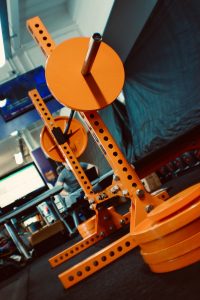
Catching all the coverage of UK’s strongest man, World’s Strongest Man, and the Giant’s Live Strongman Tour on TV over the Christmas period had re-ignited my passion for the sport. Whilst preparing for the OBC Christmas competition in December 2018 I had also started my own collection of strongman equipment. This financial investment for me was a kind of guarantee that I would be taking the next year of training very seriously and working towards a greater appreciation of the sport, and competing in it.
A massively important factor in keeping me accountable and on track is to commit early to the “event” that I will be training for, and sharing this with my friends, family, and peers (training partners). It gives purpose, motivation, and direction to every action, every session, every meal and every sensible decision that leads me along the path towards the goal.
It gives me a reason to keep putting one foot in front of the other and lights the fire in my belly when, at certain times, it might have been the easier option to skip that training session that doesn’t sit at the top of the list of things I want to do. It makes the discipline a MUST, and not an option. The alternative of showing up to the competition unprepared, without having trained HARD for it, or worse still not showing up at all, would be frankly disappointing for myself and everyone I have shared my goals with along the way.
LESSON TWO. Seek help.
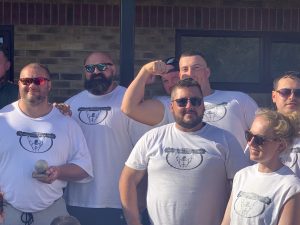
At nine years in, I remain barely out of the beginner phase – at a push an intermediate in the strength training game. There is so much more ground for me to cover in terms of competing and the marathon of progression in strength training. That makes it unrealistic for me to ever be truly objective in important decisions regarding my programming and competition preparations.
It is also unrealistic and very self-centered to expect that your friends and family will remain as consistently interested in your hobby as you are. Often, they will be the most understanding and most encouraging of “falling off” and might even encourage you to just “take it easy” instead of consistently turning up and working hard towards the goals that have already been set.
Your best friend, parent, partner or your self, frankly WILL NOT keep you accountable to your goals to the same degree that a coach will. The professional exchange of both expert guidance, and simply having someone that CARES if you do well, or not, is in my opinion the single most important step an athlete can take in stepping up their game and taking their passion seriously.
The fact you are paying someone to do this is important for two reasons. Firstly as an athlete, you will be less likely to fall short on the expected and necessary amount of work needed to progress, as you feel that will be money WASTED on a coach when you are not giving as much as effort as you should be. Secondly, the fact that your coach is being PAID by makes it absolutely necessary for them to keep you engaged, constantly ask how you are finding the process, make adjustments where necessary and remain INVESTED – emotionally and financially, in your success. You simply will not find this level of investment from anyone other than a coach.
LESSON THREE. One year is a very short period of time.
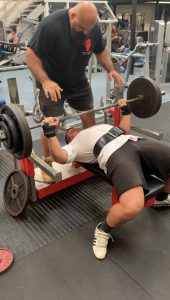
Once a commitment has been made to compete on a certain date, the focus of training instantly becomes a countdown of a limited number of sessions that lead up to (optimistically) turning up on that day your strongest and most prepared. The structuring of a training cycle in this way means that in competition prep, the volume decreases and intensity increases to become more specific to the competition, in both strongman and powerlifting. This means that those weeks of training are not spent BUILDING strength, but instead spent REALISING it. All those weeks of not building strength add up very fast. The more competitions in a year you peak for, and the more time spent near those maximal weights, the less time you are in that sweet spot of growth and strength development.
My experience this year of competing three times has taught me valuable lessons in the fine balance of the frequency of competing. By no means would I go as far to say as I experienced burn-out – I definitely went into each event motivated and excited to take part. However, in my own use of language and thought processes, I often described the final competition in December as “just one more competition”. This devalued the event significantly without me being overtly aware of it. Each training session leading up to the competition felt like I was in a way just going through the motions. There definitely was a lack of novel motivation and fear of the unknown – I ticked not much more than what I would consider the bare minimum of boxes to get me to where I needed to be. In some respects I know I fell short of what I am capable of doing outside the training sessions to ensure the best possible results.
Ultimately I was not wholly disappointed with the end result of the day, and it was a momentous occasion with several good friends competing along side me, but important lessons were learned in my approach to competing in the future in 2020 and beyond. I will need to either make sure that competitions take place far enough apart to keep them novel and exciting as they should be, or make sure that the most important event happens to be the final one of the season, so as to not devalue the final one as “just one more”.
LESSON FOUR. Choose your environment very carefully.
As much as this never-ending pursuit of strength is my own hobby, and remains a key part of my life and routine, I have absolutely NO DOUBTS that I would have fallen very short and not nearly come as far as I have if it was not shared with the friends and wider community around me.
I am blessed by having many friends with similar goals and who make training enjoyable. If it is not purely by dick-jokes and a general atmosphere of positive energy, the right group of training partners will act as your teachers, coaches, spotters, hype-men, therapists, and often crucially important – your rivals. There is absolutely nothing toxic about a healthy dose of shit-talking, and it rightly should light a fire up your ass to get better and compete with those around you. That is what makes this worth being a sport with absolute metrics and specific standards of judging so you can be compared against your peers. That said, even if you are highly competitive, the joy of seeing a training partner at his best smash a PB is comparable with doing the same yourself.
As well as having the right people around you, the place you train can also be crucially important. I need not elaborate on why a dry atmosphere in a commercial gym with bad music and a complete lack of intensity in the room can be a complete drain on your intent to have a productive training session. A focus on what kind of equipment is available to train on is going to become increasingly important as competitions approach. For example, in the lead-up to my final competition in December, it was crucial in the final few weeks for me to get in some heavy deadlifts on a stiff bar with calibrated plates, so as to better simulate the competition standard of equipment.
Personally, I invested greatly this year (in both time and finances) in training at the right place, around the right people, using the right equipment – and it has taken me forward a considerable amount.
LESSON FIVE. Visualise.
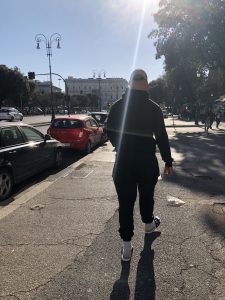
The novelty of paid holiday this year meant that I could book in several days before each competition to take as complete rest to catch up on sleep and food. I found this was an important break in my normal rhythm to mentally prepare for the approaching event.
One particularly impactful Ted Talk on YouTube that has stuck with me and given me real insight, described a prisoner of war who, whilst captive in Vietnam, visualised entire games of golf in his mind. Start to finish, not just the swings, but he created detailed courses and mentally walked through each and every moment of choosing his club and walking between each shot.
Eventually the man was released from prison and once again had the opportunity to play. Despite having no opportunity to physically practice, his game had shown a staggering improvement. The incredible science behind this phenomenon seems to demonstrate that athletes who practice visualisation will experience improvements that are nearly, if not just as effective, as doing the practice in real life.
This is an important tool in any athlete’s arsenal. If an athlete has not or cannot visualise in their mind how a competition will feel and play out, they are at a disadvantage to someone who has already lived through the successful event several times over before it has even happened.
LESSON SIX. Know your strengths, work on your weaknesses.
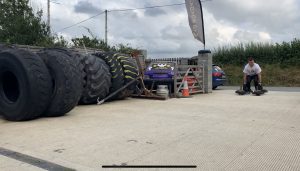
At any level, strongman is a sport that demands a variety of physical abilities and rewards being a diversely capable athlete. To some degree, depending on the events, winning competitions will require being able to move fast, being able to output constant effort for around one minute, but also be statically strong.
To date, in the few competitions that I have taken part in, I have quickly learned where exactly my strengths and weaknesses lie. Being relatively tall at 6ft 2inches, and relatively not obese (by strongman standards), this puts be at an advantage for moving events that require some element of moving fast (with weight). However these same traits then put me at a relative disadvantage against the shorter, heavier lumps that have better leverages to move heavy weight from the floor and overhead.
Knowing where I am at is GREAT news. It gives purpose and direction to my training to know where I need to work extra hard to pick up points in the weaker events, and gives me confidence in performing knowing that I am very capable of winning the events that I am built for.
LESSON SEVEN. Come prepared.
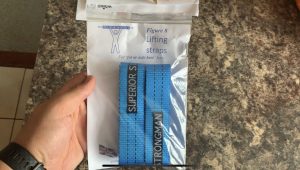
I’m only half joking when I say that half the fun of Strongman is collecting all the toys that come with it. Each lift requires its own combination of supportive equipment that ranges from mandatory to personal preference to pain prevention. This is a constantly changing experimental dance of finding what works for you on what lift, in what weather and conditions, at what point of a competition or training session. My kit bag is absolutely massive and I have invested a considerable amount of money in the things inside of it. Pre-hab and re-hab massage tools, duct tape, chalk, baby powder, tacky – the list goes on of things that a strongman will need at some point in training or competition.
In my experience, individuals will often exist somewhere on a spectrum of “full kit wanker”, fully decked out in the latest colour-way release of SBD merchandise, to “rawdog”, who believe that true strength is not needing any equipment. I have competed against guys with the later attitude – and watched them zero (fail) on events due to not being adequately prepared or informed on what kit you need and why (lets see even the strongest guy deadlift on an axle bar with no straps – you will not get any where near anyone else who is using kit).
I believe it is best to sit somewhere in the middle of the spectrum. It should not mean a tragic end to the training session if you did not bring your elbow sleeves or belt – it is still possible to get strong, and get productive work in, with absolutely nothing. But if you want to compete – do not limit yourself by being unprepared.
LESSON EIGHT. Don’t neglect the basics.
Read on for some very generic cliché advice, hopefully it reminds you to put things into perspective – we all need it sometimes.
There really is an abundance of information to take in when it comes to fitness, strength training, powerlifting and so on. Every minutia of detail, new programming strategies, technical adjustments, supplement protocol and any other possible variable can be manipulated to influence your results and your rate of progression. But it is important to not lose sight of the basics.
Training must remain enjoyable for it to be a sustainable and consistent part of your life.
You need to get enough REST outside of the gym so that you come and are able to perform and do what you need to do.
Your diet must sustain your goals. If you need to gain weight, eat lots. If you need to lose weight, eat less.
Really it boils down to that.
MAKE IT FUN. REST ENOUGH. EAT ACCORDING TO YOUR GOALS.
Those are the three things that will guarantee success in one form or another. Not some magic combination of exercises, or supplements. Everything works, providing you tick those basic boxes.
LESSON NINE. Practice the right kind of self-talk.
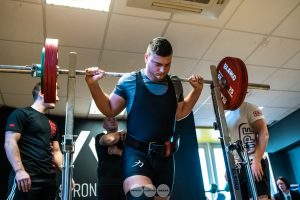
The psychology of sport runs deep. There is no overestimation of how important it is to speak things into existence. Constantly throughout your day you will be having a dialogue with yourself on your performance within your sport. Telling yourself that you can and will do something is your only hope of actually doing it.
Difficult things often don’t happen by accident, so that 140kg bench wont happen by accident. And it definitely won’t happen unless you are telling yourself you will make it happen, and you will put in the work, one day at a time, to get there.
This is another one of those things that are learned in the sport, and then can easily be applied to every area of your life outside the gym.
LESSON TEN. Show gratitude.
Writing this post has allowed me to reflect and put things into perspective on what I have achieved in the time that I have been lifting. The mentorship of my peers and coaches has been crucial in getting me to where I am. An open and encouraging atmosphere is crucial for consistent progress towards a level of achievement (and strength) that might seem almost out of reach as a beginner.
Looking back retrospectively it is almost like a certain chain of simple conversations with those mentors has a knock-on effect of massive changes in my life, my future goals, my sense of pride, my social circle, and some important parts of my identity.
So my advice to anyone looking to take steps towards a stronger version of themselves, is to engage with those around you. Whether it is comments and direct messages on social media pages, face to face in the gym with people you have never trained with, or even dialogues people involved in sports and disciplines you never imagined that you could enjoy – be interested, ask questions, show initiative and throw yourself in the deep end. Be willing to be a beginner and then put one foot in front of another and one day you will think, like I am now, “fuck, how far I have come”.
Thank you to those who have shared with me an awesome year of lifting in 2019, and cheers to a heavier 2020!
